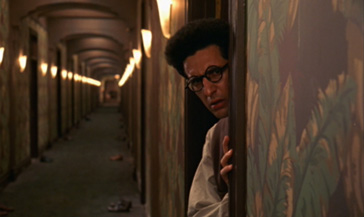|
|
Viking Night: Barton FinkBy Bruce HallJanuary 19, 2017
As a musician though, I’ve definitely stuck to that maxim. I’ve never gone out of my way to meet artists I admire. Suppose I met John Paul Jones (Zeppelin rules!) and he was a dick? There’s no telling what a trauma like that would do to my already damaged sense of creativity. Would I be inspired to succeed out of spite? Or would I crawl into a bottle and never come out? Or both? Or for that matter, would I rent a seedy hotel room in Los Angeles and roll around on the floor with John Goodman? The possibilities are endless, but it’s that last one we’re going to discuss today. Barton Fink (John Turturro) is one of the bright new lights on Broadway, and he’s really uncomfortable with it. He’s a new playwright who’s just struck it big with his first play, and it’s weighing on him. Fink is of a decidedly meek physical presence. But he speaks in grandiose, often pretentious terms about his desire to write honest material aimed at “the common man”. There’s no doubting Fink’s sincerity, but it’s hard not to notice that he in no way thinks of himself as common. It’s not that he isn’t humble. It’s just that he’s secretly almost as impressed with himself as anyone else. After being offered a lucrative contract to work in Hollywood, Fink weighs his options before reluctantly heading out West. He intimidated about writing for a form whose nuances he hasn’t mastered. He’s also under the assumption that it’ll be easy to adjust. He’s wrong, of course. But at first he’s greeted with enthusiasm by the head of the studio (Michael Lerner) and the producer of the film he’ll be working on (Tony Shalhoub). It’s a wrestling picture, and after moving into a hotel and grinding away at it for a few days, Fink has nothing to show for it. The quick and easy film gig no longer seems like either one.
|

|
|
|

|
Friday, November 1, 2024
© 2024 Box Office Prophets, a division of One Of Us, Inc.


